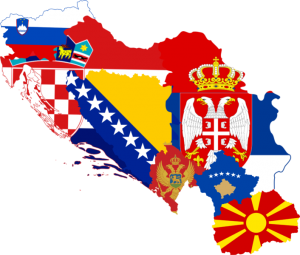
Views: 1633
Kosovo obtained part independence when America and many European nations gave the go ahead for the creation of this new nation. However, it is clear that things are not plain sailing because many other nations did not support this elitist adventure, therefore, the wider international community was ignored. Therefore, today we have a situation where some nations support this new state, however, the majority of nations in Africa, Asia, and South America, have not given their consent.
Also, the Russian Federation, Spain, and some other European nations, refuse to accept this American led adventure. Therefore, what does the future hold for Kosovo and international law?
 Firstly, the current status of limbo is a shock to America and many European nations because they believed that the majority of other nations would follow suit, however, at the moment this isn`t happening. Therefore, the influence of the Russian Federation, China, India, and other nations who are against the independence of Kosovo, is much deeper than America imagined. Also, many nations are aghast by the elitism of this new venture and of course many nations worry that the same may happen to them.
Firstly, the current status of limbo is a shock to America and many European nations because they believed that the majority of other nations would follow suit, however, at the moment this isn`t happening. Therefore, the influence of the Russian Federation, China, India, and other nations who are against the independence of Kosovo, is much deeper than America imagined. Also, many nations are aghast by the elitism of this new venture and of course many nations worry that the same may happen to them.
Another negative side effect is the fact that Abkhazia and South Ossetia in Georgia have clear justifications to claim the same rights, with regards to the American model of bypassing international law and the United Nations. So if America can violate international law so easily, then America should expect other nations to follow suit. Therefore, many other would be nations in other parts of the world also claim to have the same natural rights. Of course the United States, the United Kingdom, and others, are claiming that Kosovo is unique, but this is not based on reality because you have too many conflicts all over the world. So a “can of worms” is the real cause and effect of this naive policy.
Nations which are against this American led venture have stated clearly that they are very unhappy with the blatant attitude of elitist Western nations. The Foreign Minister of Argentina, Jorge Taiana, stated “if we were to recognise Kosovo, which has declared its independence unilaterally, without an agreement with Serbia, we would set a dangerous precedent that would seriously threaten our chances of a political settlement in the case of the Falkland Islands.”
The newly elected President of Cyprus, Dimitris Christofias, was even more outspoken because he stated “The one thing that Kosovo and Cyprus have in common, as far as the situation in these regions is concerned, is that in both cases, the basic principles of international law and legality, as well as UN decisions, are constantly being violated.” A similar comment was made by Miguel Angel Moratinos, the Spanish Foreign Minister, because he made it clear that “the Government of Spain will not recognise the unilateral act proclaimed by the assembly of Kosovo […] We will not recognise because we consider […] this does not respect international law.”
Therefore, this issue is very important and complex and it is not about denying either the majority Kosovo Albanians independence or supporting minorities like the Serbians, Roma, and other minorities in Kosovo. It is about a deeper issue and this applies to international law. So if America and her supporters can justify Kosovo then what about creating new independent nations for the Abkhazians and South Ossetians in Georgia, Palestinians, Karen in Myanmar, Tamils in Sri Lanka, West Papuans in Indonesia, Basques in Spain, Balochis in Pakistan, and the list can go on and on; so do these ethnic groups deserve independence?
This is the problem because you can no t seriously claim that Kosovo is special or unique. After all, you have countless conflicts in the world and many ethnic groups face terrible persecution. Therefore, many other ethnic groups are aghast by events and Yasser Abed Rabbo, a Palestinian politician, stated “Kosovo is not better than us. We deserve independence even before Kosovo, and we ask for the backing of the United States and the European Union for our independence. If things are not going in the direction of continuous and serious negotiations, then we should take the step and announce our independence unilaterally.”
t seriously claim that Kosovo is special or unique. After all, you have countless conflicts in the world and many ethnic groups face terrible persecution. Therefore, many other ethnic groups are aghast by events and Yasser Abed Rabbo, a Palestinian politician, stated “Kosovo is not better than us. We deserve independence even before Kosovo, and we ask for the backing of the United States and the European Union for our independence. If things are not going in the direction of continuous and serious negotiations, then we should take the step and announce our independence unilaterally.”
Also, the international community, on a whole, is saying that this colonial attitude is really not warrented and of course major institutions, like the United Nations, have been violated and the same applies to international law. So we have a genuine dilemma over this issue and again if the United Nations and international law can be violated, then why have either? Sadly, nations like the United States believe that they are above the international community because they also bypassed international law when they attacked Iraq and bombed the former Yugoslavia.
You also have problems within Kosovo itself and major divisions still exist. This especially applies to northern Kosovo because the Serbian community is relatively sizeable throughout this region. Therefore, you still have major flashpoints and Serbians, the Roma, and other minorities, feel isolated or abandoned. Also, the international community must still guard and protect Serbians, the Roma, and other minorities, throughout the whole of Kosovo. This in itself is evidence that the institutions of Kosovo are weak.
Therefore, the longer this situation remains in limbo the worse it will get because we have already seen convulsions in Georgia based on the Kosovo model. Whereby nations can now clearly state that America, the United Kingdom, France, and others, violated international law, therefore, other nations can follow suit and support their own self interests. So what does the future hold for Kosovo, countless other conflicts throughout the world, the United Nations, and international law?
Originally published on 2010-06-24
Author: Lee Jay Walker, The Modern Tokyo Times
Origins of images: Facebook, Twitter, Wikimedia, Wikipedia, Flickr, Google, Imageinjection & Pinterest.
Read our Disclaimer/Legal Statement!
Donate to Support Us
We would like to ask you to consider a small donation to help our team keep working. We accept no advertising and rely only on you, our readers, to keep us digging the truth on history, global politics and international relations.
FOLLOW US ON OUR SOCIAL PLATFORMS










